|
|
|
Sort Order |
|
|
|
Items / Page
|
|
|
|
|
|
|
| Srl | Item |
| 1 |
ID:
101848
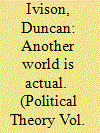

|
|
|
|
|
| Publication |
2011.
|
| Summary/Abstract |
There have been two distinctive aspects to James Tully's approach to the study
of imperialism over the years, and both are put to work in these remarkable
volumes.
1
The first is his belief in two seemingly contradictory claims: (i) that
imperialism is much more pervasive than usually thought (conceptually, historically and practically); and yet (ii) that there are many more forms of resistance to it than usually appreciated. The second is the way Tully places the
situation of indigenous peoples at the heart of his analysis. This goes back to
his groundbreaking work on Locke, and his extraordinary re-interpretation of
Locke's work in the context of early modern discourses of imperialism. But the
situation of indigenous peoples also deeply informed his argument in Strange
Multiplicity
2
-and not only in terms of the central motif of the lectures provided by Haida artist Bill Reid. In that book, he sought to reveal and defend a
much richer conception of legal and cultural pluralism than had hitherto been
appreciated by liberal constitutionalists and their critics. Indigenous peoples
are not simply a litmus test for our thinking about pluralism but represent a
much deeper challenge to the way we conceptualize notions of citizenship,
sovereignty, democracy and freedom in the first place-and indeed the nature
of political philosophy itsel.
|
|
|
|
|
|
|
|
|
|
|
|
|
|
|
|
| 2 |
ID:
101841


|
|
|
|
|
| Publication |
2011.
|
| Summary/Abstract |
This essay argues that many modern discussions of Locke's political theory are unconsciously shaped by an imaginative picture of the world inherited from the past, on which authority and freedom are fundamentally antipathetic. The consequences of this picture may be seen in the distinction made customarily in Locke studies between the 'authoritarian' Locke of Two Tracts on Government, for whom authority descends from God, and the later, 'liberal,' Locke, for whom authority arises from the will and agreement of individuals, and felt in the emphases placed on consent and resistance in most interpretations of Lockean political thought. The essay examines the composition and contours of this picture and, by holding up a mirror to contemporary Locke scholarship, draws attention to some of the ways in which it unwittingly distorts Locke's thinking.
|
|
|
|
|
|
|
|
|
|
|
|
|
|
|
|
| 3 |
ID:
101843
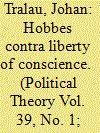

|
|
|
|
|
| Publication |
2011.
|
| Summary/Abstract |
It has often been argued that, notwithstanding his commitment to the authoritarian state, Thomas Hobbes is a champion of the "minimal" version of liberty of conscience: namely, the freedom of citizens to think whatever they like as long as they obey the law. Such an interpretation renders Hobbes's philosophy more palatable to contemporary society. Yet the claim is incorrect. Alongside his notion of "private" conscience, namely, Hobbes develops a conception of conscience as a public phenomenon. In the following, it is argued that this inconsistency serves the purpose of deception: it holds out the possibility of dissent while making it impossible to utilise. Arguably, moreover, this is the proper hermeneutical approach to take to Hobbes's inconsistencies in general. Indeed, said inconsistencies ought to alert contemporary normative theorists to the instability of the "minimal" version of liberty of conscience attributed to Hobbes: Hobbes himself, namely, shows that it is insufficient.
|
|
|
|
|
|
|
|
|
|
|
|
|
|
|
|
| 4 |
ID:
101844


|
|
|
|
|
| Publication |
2011.
|
| Summary/Abstract |
Hobbes in Leviathan, chapter xv, 4, makes the startling claim: "The fool hath said in his heart, 'there is no such thing as justice,'" paraphrasing Psalm 52:1: "The fool hath said in his heart there is no God." These are charges of which Hobbes himself could stand accused. His parable of the fool is about the exchange of obedience for protection, the backslider, regime change, and the tyrant; but given that Hobbes was himself likely an oath-breaker, it is also self-reflexive and self-justificatory. For, Hobbes's fool is not a windbag (follis), or one of the dumb mob, led astray by priests (stultus). He is, in the terminology of Psalm 52, an insipiens, a madman or raving lunatic, whose rebellion against God the King is his own destruction and that of his people. A long iconographic tradition portraying the fool as insipiens, Antichrist, heretical impostor and tyrant king, was at Hobbes's disposal.
|
|
|
|
|
|
|
|
|
|
|
|
|
|
|
|
| 5 |
ID:
101845
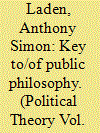

|
|
|
|
|
| Publication |
2011.
|
| Summary/Abstract |
What I would like to do in these brief remarks is offer a characterization of
what James Tully calls public philosophy, in part by situating it amongst other
more familiar positions in contemporary political philosophy, but also in part
by suggesting how once we grasp what is distinctive about this approach, it
can help us see that familiar terrain anew. To keep to Tully's musical metaphor, this will be an exercise in amplifying the bass line, the ostinato, in order
to make it easier for the rest of us to join Tully in his new key. With limited
space, what I say will be more suggestive and sketchy than I would like. It will
amount to humming a few bars in the hope that others can take up the tune. Or,
to use one of Tully's favorite images from Wittgenstein, to count 2, 4, 6, in the
hopes that you will know how to go on.
Let me start with a very crude map of three trends in contemporary political philosophy
|
|
|
|
|
|
|
|
|
|
|
|
|
|
|
|
| 6 |
ID:
101846
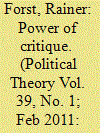

|
|
|
|
|
| Publication |
2011.
|
| Summary/Abstract |
I regard James Tully's work to be among the most important and innovative
in the contemporary field of what we could call critical political theory. This
not least for the reason that, apart from its many virtues, such as its unique
combination of historical and contemporary social analysis, Tully's approach
explicitly places the theoretical and practical task of social criticism at its
methodological and normative center.
1
I highlight "theoretical and practical"
here to indicate that I will raise some questions about the relation between the
two, and I also highlight "methodological and normative" to do the same
|
|
|
|
|
|
|
|
|
|
|
|
|
|
|
|
| 7 |
ID:
101847
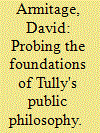

|
|
|
|
|
| Publication |
2011.
|
| Summary/Abstract |
James Tully's Public Philosophy in a New Key is a complex intellectual edifice. Tully deftly deploys the philosophical tools forged by, among others,
Wittgenstein, Arendt, Foucault, and Skinner to dismantle the architecture of
modern political reason in order to build in its place a more robust structure
adequate to the needs of a "de-imperialising age."
1
The resources he uses are
unusually diverse, ranging across the whole canon of Western political
thought, via historical methodology and critical philosophy, to the works of
contemporary public activists. The result, to paraphrase one philosopher who
is definitely not part of his synthesis, is a building for dwelling, and a dwelling for thinking
|
|
|
|
|
|
|
|
|
|
|
|
|
|
|
|
| 8 |
ID:
101849
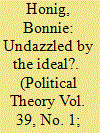

|
|
|
|
|
| Publication |
2011.
|
| Summary/Abstract |
"If we wish to do justice to the conflicts that surround us and lead to one tragedy
after another, we can do no better than to keep the example of Antigone
constantly in mind," says James Tully in Strange Multiplicity.
2
But it is not
Sophocles' lamenting title character that draws Tully, nor is it the playwright's
tragic message. It is Haemon, the "exemplary citizen of the intercultural common ground" (23), who sees the justice of Antigone's claim and pleads with his
father, Creon, for restraint.
3
Sophocles' play is unmentioned in the two volumes
of Public Philosophy in a New Key but, like Haemon, Tully here positions
himself between the worlds of dissidence and governance, speaking to the
powerful in soft reasonable tones on behalf of subaltern subjects, and arguing
that we can break out of seemingly tragic impasses if we take instruction from
the "rough ground" of politics and the pacific ways of nature
|
|
|
|
|
|
|
|
|
|
|
|
|
|
|
|
| 9 |
ID:
092529
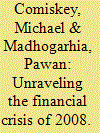

|
|
|
|
|
| Publication |
2009.
|
| Summary/Abstract |
In the fall of 2008, the world economy experienced a "once-in-a-century credit tsunami" (Greenspan 2008, 1). Centered in the market for homes and mortgages, the mechanisms that unleashed this financial tidal wave are many and complex. Indeed, an inadequate grasp of modern finance on the part of "the most sophisticated investors" and regulators "in the world" was itself a contributing factor (Greenspan 2008, 3).
|
|
|
|
|
|
|
|
|
|
|
|
|
|
|
|
|
|
|
|
|